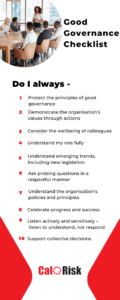What is good governance?
Governance can be defined as: “The system by which entities are directed and controlled. It is concerned with structure and processes for decision making, accountability, control and behaviour at the top of an entity. Governance influences how an organisation’s objectives are set and achieved, how risk is monitored and addressed and how performance is optimised.” (United Nations Economic and Social Commission)
Implementing good governance systems can prevent crises down the line, but also help you to monitor your organisation and its workings effectively. Keeping an up-to-date risk register can make good governance an easy task and ensure operational resilience overall.
One of the key aspects of any governance code is the review process. Ensuring that you are regularly reviewing your risk and compliance to prevent potential incidents or crises down the road.
When it comes to the Board, we should look at how the board is performing as a unit and how are the individual members of the board performing as part of the collective, and habitually monitor the effectiveness of this.
The board review process should look at the Tasks, the Team, and the Individual. The members should reflect on their own behaviour and attitudes. By asking yourself questions regularly, to ensure that you know all aspects of the organisation, from a grassroots level to the very top of the board, you can help your organisation remain resilient and practice good governance. Here are 10 questions to begin your governance journey and then add other questions relevant to your organisation to ensure you are practising good governance.

The six principles of Good Governance
According to the British and Irish Ombudsman, the six principles of good governance are:
Independence
Ensuring and demonstrating the freedom of the office holder from interference in decision-making:
- Freedom from interference in decision-making on complaints
- Appropriate and proportionate structure and financial arrangements
- Appointment, reappointment and remuneration of the office holder consistent with ensuring independence
- Governance arrangements which ensure and safeguard the independence of the office holder and the scheme
- Those involved in the governance of the scheme to conduct themselves at all times in the best interest of the scheme
Openness and transparency
Ensuring openness and transparency in order that stakeholders can have confidence in the decision-making and management processes of the scheme:
- Clear explanation of legal constitution, governance and funding arrangements
- Open and clear policies and procedures, and clear criteria for decision making
- Clear and proper recording of decisions and actions
- Free availability of information and publication of decisions, consistent with the statute, contract and good practice of Clear delegation arrangements, including levels of authority
- Register of interests, to apply to the office holder, appropriate staff members and members of any governing body
Accountability
Ensuring that all members of the scheme, including the office holder staff members and members of any governing body are seen to be responsible and accountable for their decisions and actions, including the stewardship of funds (with due regard to the independence of the office holder):
- Subject to appropriate public or external scrutiny
- Accountable to stakeholders for the operation of the scheme
- Financial accountability, and appropriate internal controls to demonstrate the highest standards of financial probity
- A robust mechanism for review of service quality
- Clear ‘whistle-blowing’ policy
Integrity
Ensuring straightforward dealing and completeness, based on honesty, selflessness, and objectivity, and ensuring high standards of probity and propriety in the conduct of the scheme’s affairs and complaint decision making:
- Impartiality in all activities
- Identify, declare and deal with conflicts of interest (including office holder, staff members and members of any governing body)
- Compliance of all those involved in the governance or operation of the scheme with relevant principles of public conduct
- Arrangements for dealing with conflicts about governance issues
Clarity of purpose
Ensuring that stakeholders know why the scheme exists and what it does, and what to expect from it:
- Explanation of the purpose of the scheme and who it serves
- Clear status and mandate of the scheme
- Clarity of extent of jurisdiction
- Governance arrangements which are clear in relation to the office holder’s adjudication role
By applying these principles, and asking yourselves a few questions, you can strengthen your resolve against crisis.
The CalQRisk integrated software solution further simplifies this for you, by keeping an up-to-date knowledge base of all the risks and regulations you need to follow, as well as streamlining your risk processes and allowing you to import your existing risk registers, giving you a real-time analysis of your compliance and monitoring. If you would like to know more about our GRC (Governance Risk and Compliance) software solution, contact us to request a free tailored demo.
Summary
Governance can be defined as: “The system by which entities are directed and controlled. It is concerned with structure and processes for decision making, accountability, control and behaviour at the top of an entity. Governance influences how an organisation’s objectives are set and achieved, how risk is monitored and addressed and how performance is optimised.” The 6 principles of good governance (Independence, Openness and Transparency, Accountability, Integrity and Clarity of Purpose) helps to focus clear and good governance guidelines for organisations. By asking yourselves questions, you can ensure that you can remain compliant and prepare for incident and crisis in future.
The CalQRisk integrated software solution further simplifies this for you, but keeping an up-to-date knowledge base of all the risks and regulations you need to comply with, as well as streamlining your risk processes by allowing you to import your existing risk registers and giving you real-time analysis of your compliance and monitoring. If you would like to know more about our GRC software solution, contact us to request a free tailored demo.











